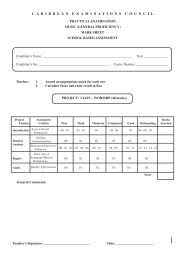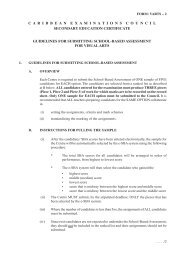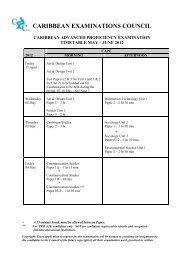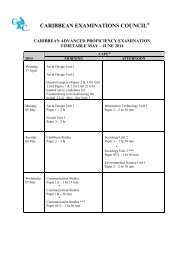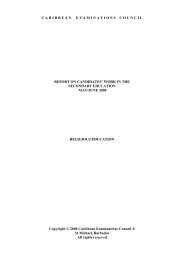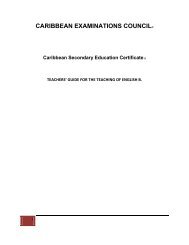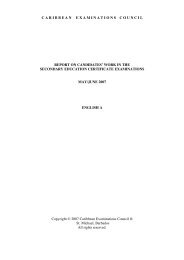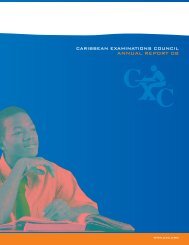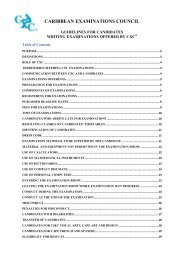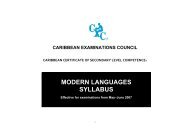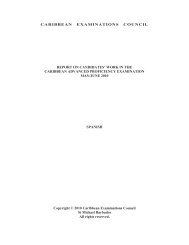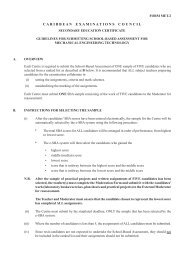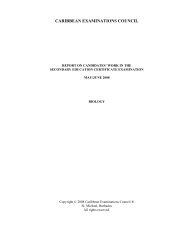CXC Examiner May 2012 - Caribbean Examinations Council
CXC Examiner May 2012 - Caribbean Examinations Council
CXC Examiner May 2012 - Caribbean Examinations Council
You also want an ePaper? Increase the reach of your titles
YUMPU automatically turns print PDFs into web optimized ePapers that Google loves.
The <strong>Caribbean</strong> <strong>Examiner</strong>RECOGNITION OF <strong>CXC</strong> QUALIFICATIONS<strong>Caribbean</strong> students are among the most mobile in the world; therefore,students need to know that the qualifications they earn from <strong>CXC</strong> are apassport to enable them to pursue tertiary education anywhere in theworld. This section samples the recognition of <strong>CXC</strong>’s qualifications by variousinstitutions and documents the testimonials of some past students.ECE on <strong>CXC</strong>QualificationsBy Melissa GaniereEducational Credential Evaluators, Inc.(ECE) is a private, non-profit credential evaluationagency established in 1980 in the United States.We prepare reports that identify the United States’equivalents of academic qualifications earned inother countries to facilitate educational exchangesand aid in the mobility of students. ECE has beenpreparing evaluation report for students holdingvarious <strong>Caribbean</strong> <strong>Examinations</strong> <strong>Council</strong> (<strong>CXC</strong>)qualifications since its inception.The <strong>Caribbean</strong> Secondary EducationCertificate (CSEC) is widely considered to bethe equivalent of a US high school diploma.As a recognised examination scheme usedprimarily as an admission tool throughout theCommonwealth <strong>Caribbean</strong>, CSEC results arealso relied upon for matriculation into highereducation institutions in the United States. CSECresults are viewed as an accurate assessment ofstudent performance and a barometer of futuresuccess in a collegiate setting. Students who havetaken the CSEC tend to have little resistancewhen applying to colleges and universities, whilethose who opt not to sit for the examination mayfind their opportunities for studying abroadsomewhat limited. Generally, it is the CSECresults that are used in calculating the overallsecondary school grade point average.The <strong>Caribbean</strong> Advanced Proficiency<strong>Examinations</strong> (CAPE) are considered by ECEto represent the US equivalent of post-secondarylevel study. Successful CAPE candidates oftentransition into US bachelor’s degree programmeswith significant advanced standing. Becausethe two-year CAPE programme coincides withtwo-year, 60-credit or more, associate degreeprogrammes offered by <strong>Caribbean</strong> communitycolleges, ECE recommends nine semester hoursof undergraduate credit for each CAPE unitacheived. (A curriculum of seven CAPE units isrequired to earn a <strong>CXC</strong> Associate Degree).Since CAPE was developed as a regionalreplacement for traditional British Advancedlevel examinations, there is some confusion inthe US surrounding the difference in meaningand purpose of the CAPE Associate Degree andAdvanced Proficiency Diploma (comprised ofsix CAPE units) as they relate to A-Levels. USinstitutions often recommend up to one yearof advanced standing in degree programmesfor A-levels, but as educational structures in<strong>Caribbean</strong> countries have shifted away from theBritish tradition to be more aligned with a USassociate degree/bachelor’s degree system, upto two years of advanced standing credit maybe considered for the CAPE programme. Aconsistent approach at US universities andcolleges is lacking with respect to where or howto place students with a two-year associate degreeearned at <strong>Caribbean</strong> community college versus30 MAY <strong>2012</strong> www.cxc.org



